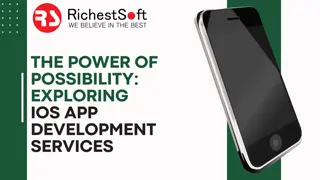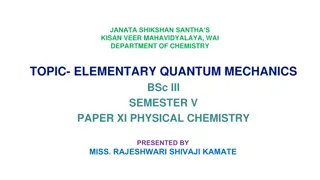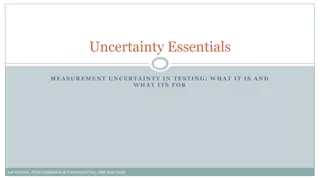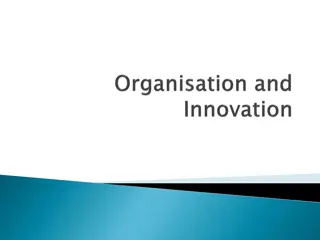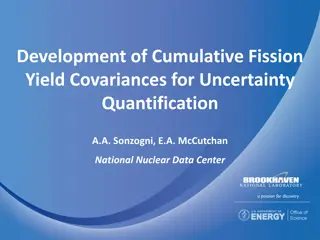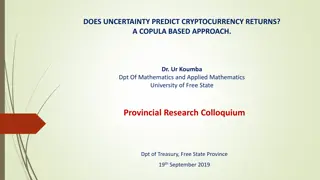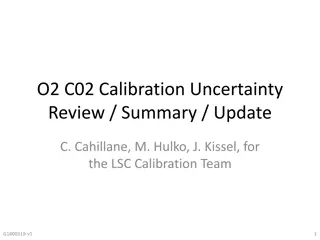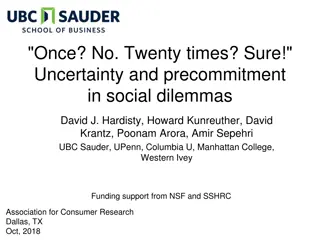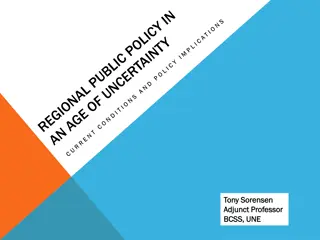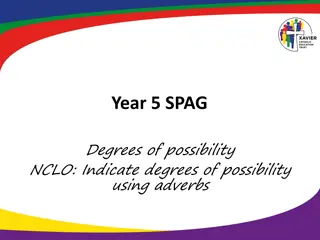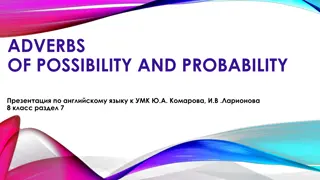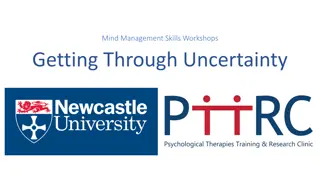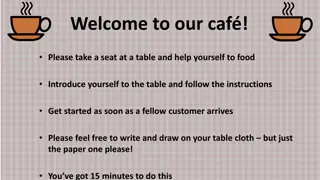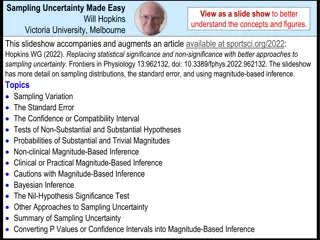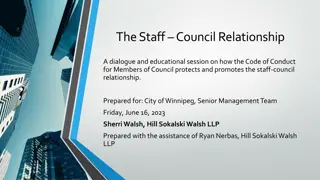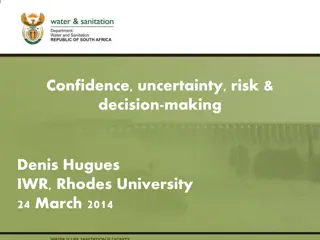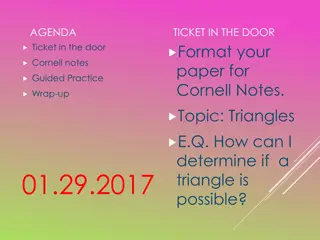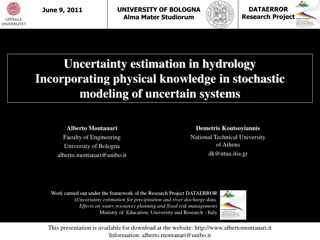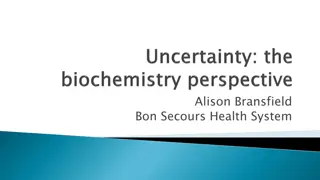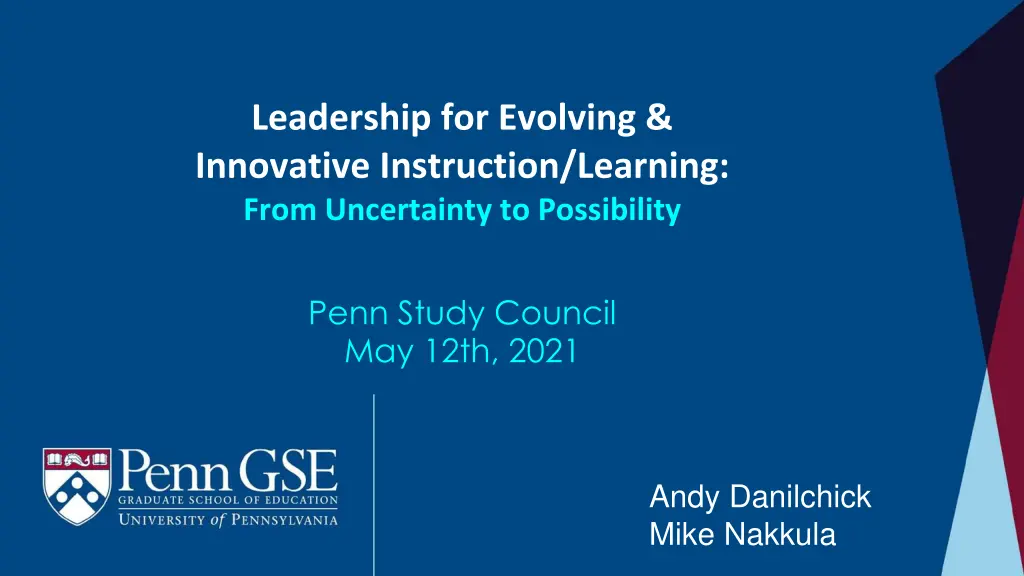
Inspiring Leadership for Uncertain Times
Explore the concept of uncertainty mindset and how it can lead to innovation and growth in leadership and learning. Learn from unexpected positive experiences during challenging times and embrace change with curiosity and flexibility. Discover the power of planned happenstance and critical consciousness in navigating uncertainties towards possibility development.
Download Presentation

Please find below an Image/Link to download the presentation.
The content on the website is provided AS IS for your information and personal use only. It may not be sold, licensed, or shared on other websites without obtaining consent from the author. If you encounter any issues during the download, it is possible that the publisher has removed the file from their server.
You are allowed to download the files provided on this website for personal or commercial use, subject to the condition that they are used lawfully. All files are the property of their respective owners.
The content on the website is provided AS IS for your information and personal use only. It may not be sold, licensed, or shared on other websites without obtaining consent from the author.
E N D
Presentation Transcript
Leadership for Evolving & Innovative Instruction/Learning: From Uncertainty to Possibility Penn Study Council May 12th, 2021 Andy Danilchick Mike Nakkula
To Get Things Started... In small groups of about 4 please share, 1. Your name 2. Your role 3. Serendipity: something unexpected but positive that you experienced during this challenging year Where did it come from? What change/opportunity came with it? How may it impact your future?
When everything is uncertain, everything that is important becomes clear. Dr. Caroline Leaf
An uncertainty mindset can move us from inaction to action. An Uncertainty Mindset is a disposition that encourages embracing the unknown to remain responsive to needs and opportunities as they emerge. Responsive Adaptable Flexible Curious Open to New Opportunities
The Uncertainty Mindset: Theoretical Framework POSSIBILITY DEVELOPMENT, MICHAEL NAKKULA AND THE PROJECT FOR MENTAL HEALTH AND OPTIMAL DEVELOPMENT CRITICAL CONSCIOUSNESS, PAULO FREIRE THEORY OF PLANNED HAPPENSTANCE, JOHN KRUMBOLTZ INQUIRY AS STANCE, MARILYN COCHRAN-SMITH AND SUSAN LYTLE
The Uncertainty Mindset Planned Happenstance Critical Consciousness & Inquiry as Stance Possibility Development Openness to Learning Critical Analysis of Inequity Awareness Commitment Imagination Skills Confidence Action Possibility Mindset Curiosity Persistence Flexibility Optimization
Planned Happenstance Planned Happenstance Preparing oneself to take advantage of unplanned events. For example, the COVID era has taught people how to use virtual technology like breakout rooms. Curiosity Persistence Flexibility Optimization
Curiosity to Explore Learning Opportunities What am I curious about in my practice? What blocks me from being curious? Stepping back and reflecting, what can I be curious about that I haven t yet noticed? How do I create space to be more curious in my practice? What structures and tools would be helpful in cultivating curiosity?
Curiosity to Explore Learning Opportunities Task: Design/brainstorm structures, tools, or practices that can engage someone in being more curious. List 1-2 of these in chat.
Persistence to Deal with Obstacles What obstacles and barriers get in the way of my work and in the way of pursuing things I am curious about? Where do these obstacles and barriers come from? Which obstacles and barriers are the most important priorities to engage with? How can I strengthen persistence in the face of these obstacles? What resources and supports can further strengthen persistence?
Persistence to Deal with Obstacles Task: In small groups of about 4, discuss: The obstacles that you have faced this year How you have managed these challenges Insights/wisdom you have gained about persistence
Persistence to Deal with Obstacles Persistence Tracker: What could it look like? How could it be helpful? What is the utility of tracking tools in general?
Flexibility to Address a Variety of Circumstances Where in my practice may I be too rigid or too fixed in my thinking? What else challenges flexibility in thinking and problem solving? Identify situations where flexibility can be helpful. What can help me be more flexible?
Flexibility to Address a Variety of Circumstances Task: Think of examples of flexibility that you have seen/experienced this year List your example(s) in chat. Why does flexibility matter? Why is it important to challenge rigid ways of thinking and doing?
Optimization to Maximize Benefits of Unplanned Events What unexpected things are happening in my environment and practice? What can I do to take advantage of these situations? How do I look for serendipity? What are the short-term steps that can be taken? What are long-term opportunities for innovation and change?
Optimization to Maximize Benefits of Unplanned Events Task: In small groups of about 4, discuss: The most important unplanned events that you have faced this year How have these events aligned with your priorities? How you have maximized benefits?
Critical Consciousness & Inquiry as Stance Critical Consciousness & Inquiry as Stance Being aware of how uncertain or unstable times or situations tend to have an extra impact on populations that are marginalized, like students from lower-income backgrounds or teachers with particularly heavy family responsibilities. Openness to Learning Critical Analysis of Inequity Awareness Commitment
Openness to Learning from Interactions that Create Uncertainty Where do I experience uncertainty in my environment and with interactions with others? What can I learn about and from the uncertainties? What blocks me from taking time to understand and learn from uncertainties? How can I learn with others or share what I learn with others?
Openness to Learning from Interactions that Create Uncertainty Task: Journal/write answers to these questions. Where do I experience uncertainty in my environment and with interactions with others? What can I learn about and from the uncertainties? What blocks me from taking time to understand and learn from uncertainties? How can I learn with others or share what I learn with others?
Openness to Learning from Interactions that Create Uncertainty Mindset: Identify every uncertainty as a learning opportunity Prioritize: Choose which uncertainties to engage with for deeper learning
Critically Analyze Inequity Looking critically across my environment, where do I see inequity? What inequities can be mitigated or solved in the short-term? Which inequities will take more effort and long-term planning? Where might there be inequity that I don t see? How might I learn about that? What are the barriers to equity? What resources, supports, individuals, and groups can be engaged to dismantle inequity?
Critically Analyze Inequity Task: In small groups of about 4, discuss: How have you addressed issues of racial inequity this year? What are ways you can enhance teamwork/ collaboration to collectively critically analyze inequity?
Moving from Awareness to a Commitment to Action Reflecting on awareness of uncertainty, inequities, issues, challenges, and possibilities, what do I want to do or what needs to be done? What actions are priorities? What can distract or deter me from taking action? Given these challenges, how can I stay committed to action? What structure can I put in place to monitor/evaluate/adjust the action?
Moving from Awareness to a Commitment to Action Task: In chat, list your top two priorities for action. What do you most what to change or develop? Let s develop the social capital of this network: Look through chat, identify 1-2 people that you could connect with to support each other with action on your priorities. Make a plan on how you will connect to them
Possibility Development Possibility Development The processes for envisioning and acting on possibilities to pursue such as becoming more knowledgeable about racial equity issues or creating a better work/life balance. For organizations, that could mean enhancing distributed leadership or integration of social emotional learning throughout a district. Imagination Skills Confidence Action Possibility Mindset
Imagination Personal How do I want to grow and change? What future goals do I have for myself (short-term, mid-term, and long- term)? What future do I want to imagine? One marked by greater stability with what I am currently doing? One marked by minor or major changes? Organizational What can I imagine in my organization s future? How can my organization be better?
Skills Personal What skills will I need to develop? What practices will develop the skills? What skill goals can I set? Organizational What skills will I need to help my organization improve? How do I set conditions to develop skills in others? What skill goals could be helpful for the organization?
Confidence Personal What can block me from taking action? How can I build the confidence to respond to such obstacles? How can I bolster my confidence to start with action and see it through? Organizational What is the status of our organization s collective confidence to pursue its goals? What limits our organization s collective confidence in pursuing its goals? (e.g., distributed leadership, role differentiation to cover the bases, etc.)
Mindset Shift: From Problem to Possibility How can I reframe problems as possibilities, viewing every problem as a problem of practice for possibility development?
Possibility Development Planner Possibility Development Task: In small groups of 4, support each other in completing the possibility development planner (Work, Talk, & Share) Each individual should choose either personal or organizational to start the work Imagination Skills Confidence Action Possibility Mindset
Debrief In the chat, highlight something useful or important someone in your small group shared.
Concluding Thoughts What have you learned? What do you need or want to learn more about? Moving forward, what will you do? What questions do you have?
Contact Us Andy Danilchick danila@upenn.edu; 610-986-2841 Mike Nakkula mnakkula@upenn.edu

